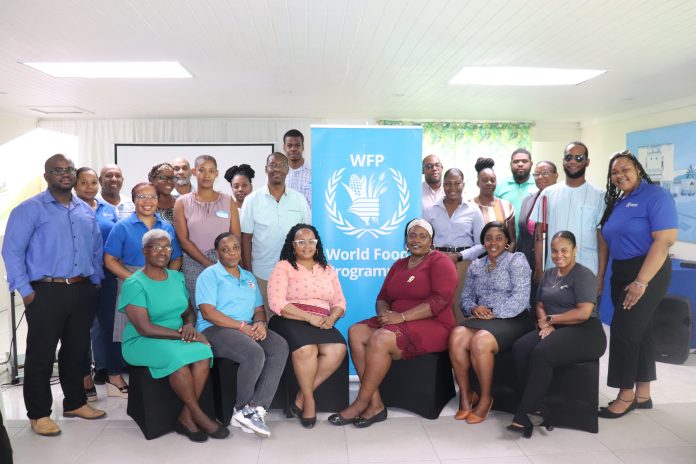
Wednesday, August 28, 2024. Roseau, Dominica– The Department of Social Services within the Ministry of Health, Wellness, and Social Services, in collaboration with the World Food Programme (WFP), successfully hosted a two-day workshop titled “Effective Preparation for Impact and Needs Assessments for Hurricane Response.”
The workshop, which was held on Thursday, August 22, and Friday, August 23, 2024, brought together all relevant ministries and subcommittee members to review the current National Emergency Planning Organisation (NEPO) National Disaster Plan (NDP) and clarify roles and responsibilities as outlined in the response mechanisms and framework, focusing specifically on impact and needs assessments.
“For any humanitarian and disaster response, timely and accurate assessments are crucial for effectively identifying and addressing the needs of affected populations. This is a key area where the World Food Programme (WFP) focuses its expertise, including work in supporting shock-responsive social protection programmes in Dominica in partnership with the Ministry of Health, Wellness, and Social Services,” explained Ayisha Richards, who is the Programme Assistant of the United Nations World Food Programme Caribbean Multi-Country Office, Dominica Satellite Office.
The workshop featured expert-led sessions focusing on key aspects of impact and needs assessments, including data collection methodologies, harmonization of assessment forms among key government and non-governmental organizations, identifying gaps and possible opportunities for digitization, community engagement tactics, and resource allocation strategies.
“As we continue to improve on our preparedness for the 2024 hurricane season and beyond, the Ministry of Health Wellness and Social Services in partnership with the World Food Programme is honored to welcome you all to this critical hurricane response exercise on impact and needs assessments,” said Delia Giddings Stedman, Director of the Department of Social Services.
“The Department of Social Services’, experience with Hurricane Maria in 2017 and most recently the impact of the 2022 trough system in Petite Soufriere revealed that multiple assessments were carried out by several agencies covering a wide range of sectors.
This included rapid assessments of immediate needs, long-term recovery, and risk assessments. However, the number of assessments conducted by every agency utilised diverse methodologies resulting in lack of clarity in the planning of recovery phase,” she continued.
Participants had the opportunity to network with fellow professionals and share best practices, fostering a collaborative environment for advancing disaster preparedness. The workshop emphasized a multi-disciplinary approach, recognizing the importance of inclusion from various sectors, including healthcare, infrastructure, and social services.
“It is hoped that at the end of this activity, participants will be equipped with practical guidance for effectively conducting impact and vulnerability assessments, to inform an effective and equitable response and recovery plan for a hurricane emergency,” Giddings Stedman noted. “Your expertise and insights will be instrumental in pinpointing potential challenges and collaboratively crafting solutions that guarantee a smoother and swifter response in the aftermath of a hurricane. Through this collective effort, we strive to cultivate a more resilient Dominica, one that possesses the strength to weather any storm and safeguard the well-being of its most vulnerable citizens.”
The workshop concluded with a commitment from participants to continue their collaboration and share insights as they develop and implement their assessment plans. Support from the Government of Canada, the European Union, and the USAID Bureau for Humanitarian Assistance, made this essential emergency preparedness activity possible.

